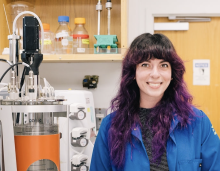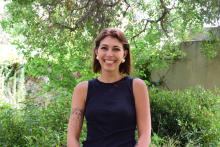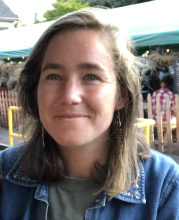Peer Graduate Advisers
The mission of the Peer Advising Group is to create a comfortable community to discuss and address concerns of first and second-year PMB graduate students.
We provide ongoing advice as students navigate common and unique issues faced in the transition to graduate school. We facilitate connections with senior PMB graduate students and provide access to the myriad of campus and community resources to help new students face and resolve their concerns in a confidential and personalized manner.
Structure
The Graduate Student Peer Advising Group currently consists of eight graduate students representing both plant biology (PB) and microbiology (MB) doctoral programs. The group is not a replacement for faculty or staff advising, but rather a supplement. While it is important for a student to have a faculty mentor and staff adviser to provide guidance throughout the educational experience and doctoral training, peers can contribute to student success in ways that complement faculty/staff advising services.
The advantages of peer advising as a component in academic advising models include flexibility in delivery methods, peer-to-peer interaction, and development of peer advisers. Peers may be better equipped to address certain aspects of advising than faculty mentors or staff members. Peer advisers view the institution through a different lens than do faculty/staff and are more familiar with the graduate student experience. Likewise, peers can better relate to students’ concerns, because they likely went through similar experiences. Because of their ability to relate, peer advisers can form personal connections with other students and facilitate peer interactions.
Confidentiality
First and second-year graduate students are encouraged to approach the graduate student peer advising group with any issues they would like to discuss. For some concerns, students may feel most comfortable when discussions with Peer Advisers remain confidential and such discussions are welcome. The Peer Advisers have received training in mentoring from Counseling and Psychological Services and are respectful of student confidentiality. However, there may be occasions when a problem arises that is beyond expertise of the peer adviser. On these occasions, the peer adviser should discuss options with the student, for example, consulting someone inside or outside of the department for additional advice. It is up to the student to decide if it's OK for the peer adviser to share any identifying or situational information with any person being consulted.
Peer advisers should feel free to describe situations (in a general manner to get advice) to:
- Head graduate advisers
- Staff in the PMB Graduate Office
- University Health Services
- Other peer advisers
Head graduate advisers and staff in the PMB Graduate Office and/or University Health Services are here to support all students, including peer advisers. Peer advisers have a responsibility to report any information regarding potential harm to a student or potential harm to others by a student. If a student talks about harm to self or others, the peer adviser should consult with Professor Arash Komeili or Lyn Rivera in the PMB Graduate Office. If danger appears imminent, the peer adviser may consult first with Counseling and Psychological Services.
Benefits and Roles for Peer Advisers
Benefits
- Develop valuable communication skills and confidence speaking in front of others
- Peer advisers develop skills such as leadership, time management, and organization
- Be recognized as a student leader and positive role model
- Gain a greater understanding of PMB and university-wide policies
- Serve as a vital resource for your peers and enrich the lives of others
- Enhance your resume and develop professional skills
Roles
- Engage in PMB recruitment and retention programs
- Provide information about PMB and university requirements, policies, and procedures
- Make referrals to a wide variety of campus services and resources
- Provide general information about career services and career options
- Participate or lead workshops in PMB
- Participate in PMB Orientation Day and in the Department and/or GGM (Graduate Group in Microbiology) retreat
- Respond to student emails
- Liaise with PMB, GGM, or other campus student groups and departmental committee representatives
- Commit to one or two years of peer advising
Contact Us
Graduate student peer advisers are available via email and in-person. To contact a peer adviser please send an email to any of the peer advisers listed below.:
Head Peer Mentor
Katie Shalvarjian
Peer Mentors
| Alekhya Govindaraju |  |
agovind@berkeley.edu |
|
Alexa Zytnick |
 |
alexa_zytnick@berkeley.edu |
| Alienor Baskevitch |  |
kbaskevitch@berkeley.edu |
| Andrea Anaya Sanchez |  |
andrea.anayasz@berkeley.edu |
| Anna Dmitrieva |  |
anna_dmitrieva@berkeley.edu |
| Charli Mineo |  |
charlotte_mineo@berkeley.edu |
| Claudine Tahmin |  |
claudine_tahmin@berkeley.edu |
| Dennis Suazo |  |
dennissuazo@berkeley.edu |
| Eleanor Wang |  |
eleanorwang@berkeley.edu |
| Katie Shalvarjian |  |
kshalv@berkeley.edu |
| Kelsey Hern |  |
kelsey_hern@berkeley.edu |
| Matty Weaver |  |
matty.weaver.junior@gmail.com |
| Rebecca Tarnopol |  |
tarnopol@berkeley.edu |
| Ryan Kenneally |  |
rken2794@berkeley.edu |
| Varun Sridhar |  |
varunsridhar@berkeley.edu |

